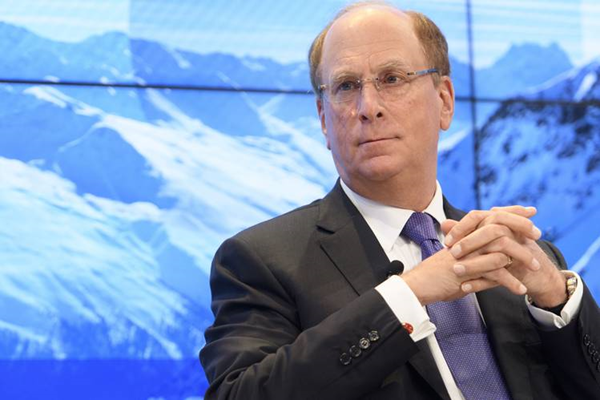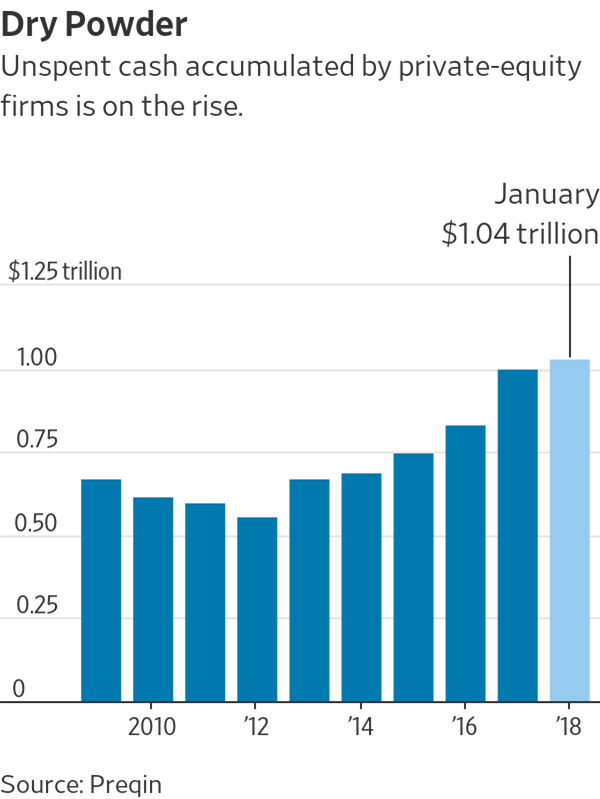THE
WALL STREET JOURNAL.
Markets
BlackRock’s Larry Fink Wants to Become the Next Warren Buffett
World’s largest
asset manager looks to raise over $10 billion to make direct
investments in companies
|

The effort sets up a rivalry for
Laurence Fink with his old firm. PHOTO: LAURENT GILLIERON/ASSOCIATED
PRESS |
By
Sarah Krouse
Feb. 7, 2018 8:00 p.m. ET
BlackRock
Inc. is looking to raise more than $10 billion that it would use to
buy and hold stakes in companies, replicating the approach of Warren
Buffett’s
Berkshire Hathaway Inc.
It is the first-ever attempt by the world’s largest asset manager
to make such direct investments, according to people familiar with the
matter. The move establishes BlackRock as a potential competitor to Wall Street
private-equity giants like
Carlyle Group LP and
Apollo Global Management LLC.
For BlackRock Chief Executive Laurence Fink, it also sets up a
rivalry with his old firm,
Blackstone Group LP. Mr. Fink co-founded
BlackRock as a division of
Blackstone in 1988 but split from the
private-equity giant in 1994.
BlackRock has since emerged as one of the biggest beneficiaries
of an investor shift to cheaper funds that mimic stock and bond indexes, topping
$6 trillion in assets for the first time in 2017.
Traditional asset managers like BlackRock and private-equity
firms like Blackstone are increasingly battling for cash from the same clients
as fees for certain products drop and competition for new pools of capital
intensifies.
Big asset managers that have long catered to cost-conscious
investors are trying to bulk up on products where they can charge big investors
private equity-like fees. It is a way to add new revenue as clients large and
small demand lower fees for traditional offerings. Private-equity firms,
meanwhile, are
offering more funds to wealthy retail investors
to broaden their pool of assets.
BlackRock’s new vehicle, known within the firm as a “long-term
private capital” vehicle, is part of that push to emphasize alternative
investments. The firm already manages $145 billion in higher-fee investment
strategies that include private equity and hedge funds of funds, real assets and
private credit. But it doesn’t have a buyout fund of its own.

It is currently seeking capital from sovereign-wealth funds,
pensions and other big investors that it would use to launch BlackRock Long-Term
Private Capital, according to people familiar with the matter.
If BlackRock can attract the roughly $10 billion it is seeking,
it would represent the largest amount ever raised by the company. BlackRock is
also contributing some of its own money to the effort.
The company is raising money on the heels of a record year for
private-equity fundraising. Private-equity firms raised a record $453 billion in
2017, according to data provider Preqin, but the amount unspent rose to more
than $1 trillion for the first time ever. That pile of unspent money has raised
concerns that the firms won’t be able to find enough investment opportunities or
generate adequate returns.
The “best known” example of BlackRock’s approach with this new
vehicle is Berkshire Hathaway, according to a fundraising document reviewed by
The Wall Street Journal. The Omaha conglomerate run by Mr. Buffett is well known
for its long-term ownership of companies.
The new vehicle plans to make investments of between $500 million
and $2 billion in companies affected by what the document says are several
“long-term themes” such as diverging demographics globally, a growing middle
class in emerging markets and changing spending patterns by millennials. It is
targeting annual returns in the low to mid teens.
The vehicle will look for investments with risks and returns that
straddle those of stock investments and what buyout funds typically seek,
according to the document. It is planning to hold those positions for more than
10 years.
BlackRock Long-Term Private Capital is likely to acquire minority
stakes in companies, the people said. The investor document cites family-owned
businesses, companies being spun out of parent firms, or companies where
private-equity investors are seeking to exit their investment.
The effort is being overseen internally by Mark Wiseman, who is
viewed as a potential successor to Mr. Fink. Mr. Wiseman joined BlackRock in
late 2016 as chairman of its alternative investing business and global head of
active equities. Since joining, Mr. Wiseman has led an overhaul of the
stock-picking business and revamped the firm’s global investment committee.
BlackRock has also hired André Bourbonnais, the chief executive
of Canada’s Public Sector Pension Investment Board, to lead the BlackRock
Long-Term Private Capital effort. Prior to his current role, he spent nine years
at the Canada Pension Plan Investment Board working with Mr. Wiseman, who
previously was the organization’s chief.
Unlike many private-equity funds, the BlackRock vehicle will take
its investors’ full commitment upfront, instead of drawing it down over time,
and will reinvest proceeds as it exits investments. It aims to avoid a cash drag
that some private-equity funds suffer from as they shop for opportunity or
return cash to investors at the end of their lifespan. Executives envision a
secondary market developing for units in the vehicle when investors want their
money back, the people said.
BlackRock will receive a management fee that covers its expenses
and a certain profit margin and a performance fee. It aims to close the
fundraising by the second quarter with four to six large investors that will
also have the right to invest additional money in certain deals.
Write to
Sarah Krouse at
sarah.krouse@wsj.com
Appeared in the February 8,
2018, print edition as 'BlackRock Makes Like Buffett.'